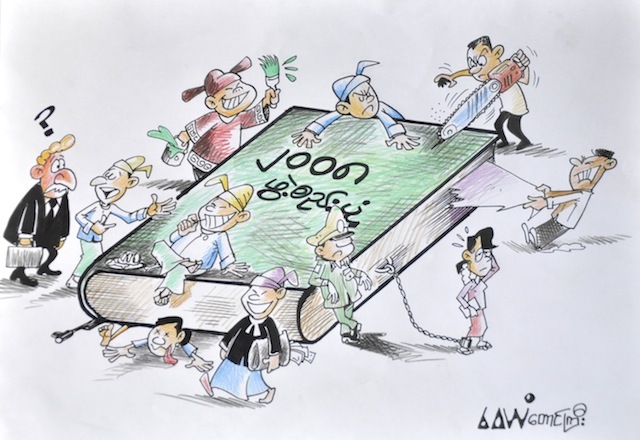The Nationwide Ceasefire Coordination Team (NCCT) said it has agreed to four of the Burmese military’s six requests, but that it cannot fully adhere to the existing laws of the country nor the current Constitution.
Speaking to DVB at the conclusion of a two-day meeting in Thailand’s northern city of Chiang Mai, Nai Hongsa, vice-chairman of the 17-member ethnic alliance, said attendees discussed the nationwide ceasefire framework, including a six-point list of proposals put forward by Burma’s Commander-in-Chief Min Aung Hlaing at a previous round of negotiations.
“The commander-in-chief has proposed a six-point wish list; however we cannot agree to two of the points,” said Nai Hongsa.
“Point five was that we, the ethnic armed groups, would pledge to fully adhere to the existing laws of the country. This effectively means we would be surrendering, politically, to Naypyidaw,” he said. “The sixth point, that we recognise the 2008 Constitution – we cannot agree with that either.”
Nai Hongsa, who is also New Mon State Party vice-chairman, said that the NCCT views the 2008 charter as undemocratic and unrepresentative of ethnic rights.
[related]
The other four points on Min Aung Hlaing’s “wish-list” are: “a genuine will for peace; adhering to all agreements; not to exploit the agreements; and not to cause a burden to the public.”
Recent clashes between government forces and Kachin, Shan and Palaung [Ta’ang] armed groups in Kachin and northern Shan states were also discussed at the Chiang Mai meeting on Monday and Tuesday, said Nai Hongsa, adding that such conflict damages the trust built during the recent peace talks, and that a continuation of hostilities could further delay any ceasefire agreement.
Solomon, deputy-chairman of the Lahu Democratic Union and a senior member in the NCCT, said, “We are seeing a lot of inconsistencies between the Burmese government, the military and parliament during this peace-building effort.
“The Burmese military seems to be keen on achieving a nationwide ceasefire but they do not want to get involved in political dialogue,” he said. “They also have issues with the terminology – for example, they don’t like to refer to ‘civil war’ or ‘resistance’ or ‘federalism’, which are terms we [NCCT] regularly employ when discussing a framework for the ceasefire.”
Nai Hongsa said the government’s ambition of reaching a nationwide ceasefire agreement by August may be somewhat “over-ambitious”.
He told DVB that the next round of negotiations with government representatives will take place in the third week of May when the focus of the meeting will be further drafting of a single-text ceasefire agreement that was outlined in March.



